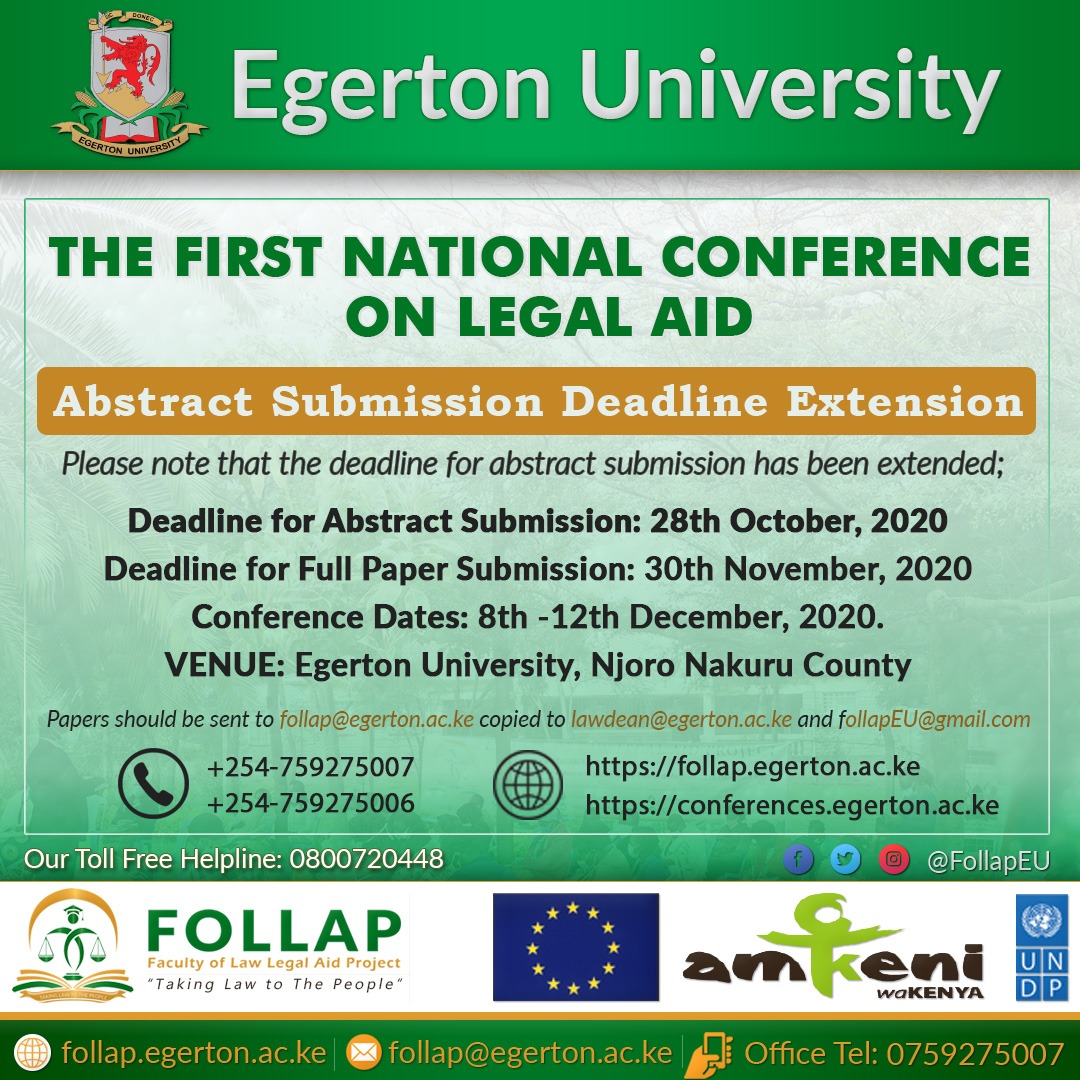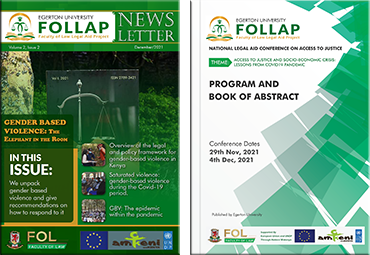THE FIRST NATIONAL CONFERENCE ON LEGAL AID
CALL FOR PAPERS, POSTERS AND EXHIBITS
THEME: STRENGTHENING ACCESS TO JUSTICE THROUGH LEGAL AID IN KENYA
Egerton University’s Faculty of Law Legal Aid Project with support from the European Union and United Nations Development Programme under the Amkeni Wakenya will be hosting a national conference on strengthening access to justice through legal aid in Kenya to be held at Egerton University, Njoro-Nakuru from 8th -12th December 2020.
Access to justice remains elusive for many Kenyans despite the enactment of legislation and the development of various policies addressing the same. This is a problem faced by many, however the poor, vulnerable and marginalized remain invariably disadvantaged due to various factors.
Under international law, governments are mandated to guarantee access to courts or alternative dispute resolutions to citizens whose rights have been violated or infringed. This obligation is encapsulated in Article 48, the Constitution of Kenya, 2010. The Constitution emphasizes on access to justice which is unhindered by costs.
It is against this backdrop that several actors have come together to provide legal advice, representation and assistance for free or at a reduced service fee. This is in a bid to facilitate access to justice to those who wish to claim their rights but cannot afford legal representation.
The conference is focused on dialogue and presentation of scholarly papers from participants and stakeholders from the justice sector, reflecting on achievements, gaps, challenges and opportunities in legal aid provision in context.
In bringing together lawyers, law students, policy makers and academics in the country and beyond, the conference intends to provoke critical thinking on access to justice and in particular, legal aid in perspective and the way forward for promoting access to justice.
Thematic areas for this call for papers should focus on the following:
- Conceptualization of access to justice within human right perspectives
- Evolution of Legal Aid in Kenya
- Analysis of the Legal Aid Act 2016 and its efficacy in enhancing access to justice
- Role of civil societies in providing legal aid services
- Role of legal education institutions in promoting legal aid services
- Gender perspective of legal aid
- Legal aid in quasi-judicial institutions
- Access to justice and traditional justice system
- Analysis of the Alternative Justice System Policy of 2020: Its efficacy in guaranteeing expedient access to justice for communities.
- Role of Alternative Justice Systems as complimentary pathways for enhancing access to justice
- Role of Social Justice Centres as alternative voices for making human rights and social justice a reality for all.
- Enhancing access to justice through community paralegals
- Legal aid and criminal justice system
- Quality assurance and legal aid services
- Models for governing, administering and funding legal aid
- Role of duty bearers in enhancing access to justice and legal aid
SUBMISSION GUIDELINES
ABSTRACT
- Academic Papers should be a minimum of 1000 words.
- Articles for Magazine 300 words
- On submitting their papers, applicants should state their Title, Author’s Name, Affiliated Institution, E-mail Address, Telephone Numbers and Curriculum Vitae consisting of not more than three pages. The Sub-Theme must also be indicated.
- Papers should be sent to This email address is being protected from spambots. You need JavaScript enabled to view it. copied to This email address is being protected from spambots. You need JavaScript enabled to view it. and This email address is being protected from spambots. You need JavaScript enabled to view it.. Applicants should ensure that their papers are forward thinking and not merely exploring an issue without any depth of analysis.
- Submissions should provide both a problem and solution based in law and/or policy.
A review committee will select paper submissions which best fit the above criteria. Only those who submit full papers will be on the Presenters’ Programme.
FINAL PAPER, POSTERS AND EXHIBITS
- The applicants will further be asked to submit full academic papers of no less than 10000 words and articles for magazine 4000 words; posters and exhibits for conference presentation and display by or before the 30th of November 2020.
- The papers should be scientific and of high value of novelty.
- Before submission, please ensure that your articles are in the form of Microsoft Word, Times New Romans font size 12 and single line spacing.
After conclusion of the conference there will be a further selection of papers for publication under two categories: A Magazine and Academic Journal. The magazine will be based on unique perspectives of access to justice through alterative justice systems and other related institutions. The Journal publication will be grounded on the academic quality and relevance of the subject to the Conference Theme. Posters and Exhibits in context will also be considered. Final submissions will be subject to peer review before publication.
IMPORTANT DATES
Deadline for Abstract Submission: 28th November 2020
Deadline for Full Paper Submission: 30th November 2020
Conference Dates: 8th -12th December 2020.
VENUE: Egerton University, Njoro Nakuru County
ETHICAL CONSIDERATIONS
Authorship: Authors must give credit through references or notes to the original author of any idea or concept presented in the paper. This includes direct quotations and paraphrases.
Publication or presentation history: If material in your presentation has been published, presented, or accepted for publication or presentation, this must be disclosed in your paper.
Conference Attendance: If your panel, paper, or interactive display presentation is accepted for the conference, you have a commitment to register for and attend the conference and perform your assigned role. If extenuating circumstances prevent you from attending, you should find a substitute to perform your duties and notify the Program Chair.
Self-Plagiarism (or Duplicate Publications): Self-plagiarism involves an author presenting earlier published material as original and new. Self-plagiarism is often not an issue, but it must be transparent and limited.
For more information please visit Egerton University Conferences Portal







